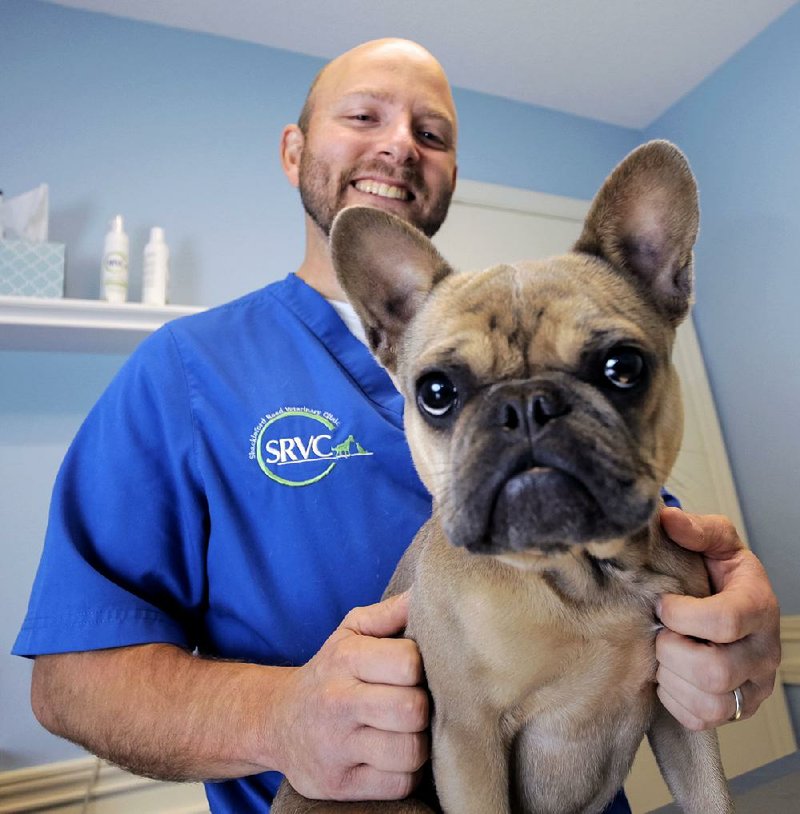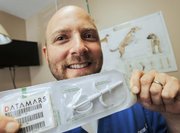They're part of the family -- fur babies, four-footed friends -- but no matter how loyal or obedient they are, they can still get lost. And no matter how smart a dog is, it can't tell kind strangers his parents' phone number.
That's where microchipping comes in. The chip is a small magnetic strip injected via needle right under the skin in the shoulder area. The owner then registers the chip's number with the chip company. If the dog is lost, a veterinarian's office or animal control center can scan the chip and pull up the owner's name and contact information, making happy reunions far more likely.
"It's kind of like an insurance policy if your dog gets out," Dr. Brian Barron says.
Barron, who graduated from Louisiana State University's veterinarian school program in 2007, is on staff at Shackleford Road Veterinary Clinic. But he also spends time helping out with local animal organizations. Barron occasionally consults with the Little Rock Animal Village veterinarian on complicated cases and does fracture repairs and major surgeries for the Humane Society of Pulaski County.
Three years ago, Leslie Taylor, one of Barron's clients who is also very active with the Friends of the Little Rock Animal Village, asked him if he wanted to be the veterinarian for the group's new low-cost microchipping events at Bass Pro Shop.
According to Barron, "I said, 'Yes. Love to.'"
Since then, Barron and his staff members have chipped an estimated 1,500 pets in the Bass Pro Shop parking lot. At last month's event, they did 183 in a three-hour period. The next event is Saturday.
The chipping itself takes about 10 seconds, sometimes more if the dog is uncooperative, but it's a quick process.
"[We're] doing pretty much a pet a minute," Barron says. "We've got it down pretty well now."
The only real challenge comes when they have a dog that hasn't spent much time in public and is, as a result, "very, very nervous."
But working together, owners and Barron's staff are usually able to calm them for the few seconds the shot takes. After all, they're accustomed to dealing with skittish pets and very few of the dogs are actually mean.
They microchip cats too, but Barron says for those he reaches into the carrier.
"It's one thing for a leashed dog, but trying to hold onto a cat when it gets wild -- they can get away and you're not going to catch them."
"Dr. Barron and his team are wonderful people and are making a difference," says Taylor, who points out that Barron and Shackleford Road Veterinary Clinic are also sponsors of the organization's Santa Paws fundraiser. "He's just the best!"
Barron knows from first-hand experience how valuable chips can be when it comes to reclaiming a lost pet. His own dogs have escaped, pulling their collars off in the process of trying to get out of the fence. Both were returned thanks to the microchip.
Many people assume that their pets' collars and rabies tags will be sufficient for finding them but, Barron says, that's not the case.
"We get more dogs returned on microchips than we ever have with collars."
Phone numbers can be wrong or outdated. Rabies tag numbers can be hard to keep up with. And, as Barron saw with his own dogs, those collars can come off.
"Even veterinarians' dogs get returned on these chips," Barron says. "It works. It works for sure."
He has seen dogs missing for over a year finally picked up, scanned and reunited with their owners. Even if the dog or cat has traveled thousands of miles, the chip is still effective. Barron himself recalls one dog from the northern tip of Missouri that was found in Little Rock and, thanks to the chip, was returned to its family.
Microchips aren't magic, though. There are things they can't do.
Barron says, "You can't track them with it -- not yet at least."
If the pet gets loose, there's no way to pinpoint its location using the chip, which only works if someone finds the pet and has it scanned.
Also, "They don't stop theft," Barron points out.
If someone steals a dog, he's unlikely to take it in to be scanned.
It's a good idea for people who have a dog they haven't owned from early puppyhood to get the dog scanned before microchipping. Some pre-owned pets may already have a chip that can then be re-registered with the new contact information.
Barron says some people are concerned about pain or discomfort caused by the chip, but they shouldn't be. Chip implantation is less painful than a vaccine, which can burn for a while after the injection. In the thousands of chips he has implanted, he says he has only had one dog develop a bit of minor swelling.
"Microchips are pretty benign. The pain associated with the microchip is literally a poke and they're fine."
Not everyone can afford the added $40-$60 microchipping can cost at a vet's office, which is why the Friends of the Little Rock Animal Village offers these microchipping events, where there's a $15 fee to pay for the chip, plus $9.99 to register the chip.
"It's a good deal," Barron says. "It's so they don't get a lot of dogs stuck at the Animal Village."
Also, even with the low cost, the events raise money for the Village -- more than $10,000 over the last three years, Taylor says.
"We couldn't do that without Dr. Barron," she says.
Owners planning to come to the event should be sure to have a good tight leash and collar on their dog as there will be a lot of other animals and the event is in a parking lot with vehicles. Cats should be secured in a carrier.
And be prepared to wait a bit -- the lines can be long. But, at a rate of about one pet per minute, it moves pretty quickly.
The Animal Village also has some of its adoptable dogs on display for the day.
"So, if you're looking for a new pet, it's not a bad place to come look."
The next Friends of the Little Rock Animal Village microchipping event will be 11 a.m.-2 p.m. Saturday at Bass Pro Shops, 1 Bass Pro Drive, Little Rock. Cost is $15 per pet, plus $9.99 to register the chip. Visit friendsoftheanimalvillage.org.
High Profile on 11/26/2017


